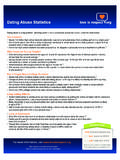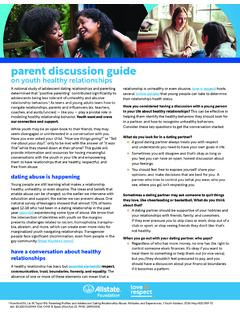Transcription of SAMPLE Parenting Skills Teaching Plan - Georgetown University
1 Georgetown University Center for Child & Human Development | Box 571485 | Washington, | 20057-1485 | 202-687-5000 | Fax: 202-687-1954 | email: Center for Child and Human Development SAMPLE Parenting Skills Teaching Plan The following SAMPLE Parenting skill Teaching plan is based on The Health and Wellness Program: A Parenting Curriculum for Families at Risk (Tymchuk, A., 2006) and on the Parents as Teachers Foundational Training Guide and Training Curriculum (Parents as Teachers National Center, Inc., 2014). This plan is facilitated by a Parent Educator from the Georgetown University Center for Child and Human Development as part of the District of Columbia s Developmental Disabilities Administration Health Initiative Project. The broader mission of GU CCHD is to advance self-determination among the diversity of people with developmental and other disabilities and their families, throughout the life course, and advocate for their full participation in all aspects of community life.
2 Parent training sessions are provided one to two times per week (approximately 90 minutes per session) depending on assessed skill development needs and focus on direct Teaching of new Skills , creating adaptive environments that support Parenting , modelling desired Skills , mentoring parents, and monitoring acquired Skills . Each skill is assessed at the beginning of the training component and quarterly thereafter and are based on each parent s assessed need in relation to the developmental needs of each child. Skills are measured on a scale from 1 to 10, with 1 indicating minimal demonstration of skill and knowledge and 10 indicating mastery of the skill ( , can demonstrate the skill with supports as described). Note that not all the SAMPLE core skill areas included in this SAMPLE would be identified for any single parent, but are included for illustrative purposes. 1 2 3 4 5 6 7 8 9 10 Target skill not observed. Requires full assistance.
3 Target skill occurs with frequent assistance. Target skill occurs with occasional assistance. Target skill occurs with intermittent assistance. Target skill occurs with infrequent assistance. Target skill completed without assistance. Georgetown University Center for Child & Human Development | Box 571485 | Washington, | 20057-1485 | 202-687-5000 | Fax: 202-687-1954 | email: Core Skill Area Goals of Training Training Supports Provided Baseline Rating Current Rating Supported Learning 1. Establish age appropriate evening routines for children 2. Promote use of age appropriate discipline 3. Establish routine use of praise 4. Provide supportive directions and expectations Visual schedule presented by parent educator & used by parent Model and practice with parent Sticker board & reward system Model and practice with parent educator 2 9 Communication 1. Engage child in age-appropriate conversations 2. Respond to child s words, sounds, babbling Model and practice with parent educator Use of verbal prompts with fading By parent educator and support staff 1 8 Child Development 1.
4 Recognize child s behavioral cues 2. Console child when upset 3. Allow child to make safe mistakes without criticism 4. Use positive behavioral supports Model and practice with parent educator Verbal prompts with fading Picture based reminder used with support from staff 1 8 Home Safety and Prevention 1. Support a safe environment 2. Maintain safety guidelines 3. Establish escape route from home/apartment Install environmental safeguards Monitor home safety Visual checklist of safety routines Visual escape plan 2 10 Common Child Health Problems and Emergencies 1. Recognize common health problems 2. Appropriately use health materials & administer medications Picture based symptom chart Model and practice with parent educator Visual reminders with support from staff 4 9 Decision-Making 1. Recognize consequences of choices 2. Practice good decision-making Model and practice good decision-making with parent educator 3 6 Georgetown University Center for Child & Human Development | Box 571485 | Washington, | 20057-1485 | 202-687-5000 | Fax: 202-687-1954 | email: Core Skill Area Goals of Training Training Supports Provided Baseline Rating Current Rating Nurturing 1.
5 Celebrate accomplishments and efforts with child 2. Balance attention to all children 3. Allow child to make safe mistakes without criticism 1. Incorporate individual time with oldest daughter Model and practice with parent trainer Visual calendars to schedule time with all children 6 10 Responding 1. Positively respond to child cues 2. Support child s expression of ideas Calmly respond to high stress situations Model and practice play activities with parent trainer Create visual schedule with goals Role-play 3 7 Financial Management 1. Establish approaches to saving income to support visitation with sons Development of a budget Establishment of a biweekly savings plan 1 4 Multi-generational 2. Managing dynamics associated with a multigenerational family Model and practice relaxation techniques and positive communication strategies 3 5 Co- Parenting 1. Establish appropriate relationship with co-parent 2. Collaborate with co-parent on all facets of Parenting Role-play good communication Skills Model and practice with parent educator 2 6 Financial Literacy 1.
6 Demonstrate basic money Skills Counting play money Visual chart of bill equivalents Using sale circulars to demonstrate the cost of items in bills Making appropriate change 0 5 Georgetown University Center for Child & Human Development | Box 571485 | Washington, | 20057-1485 | 202-687-5000 | Fax: 202-687-1954 | email: SAMPLE Summary of Parenting Skill Progress The following is a SAMPLE quarterly progress report that aggregates scores of assessed Parenting Skills for all parents receiving Parenting Teaching supports provided by the Georgetown University Center for Child and Human Development as part of the District of Columbia s Developmental Disabilities Administration Health Initiative Project. Key Metrics Total Number of Parents Assessed 36 Average Baseline Rating Average Current Rating Average Improvement 69% Average Length of Skill Training 9 months Skill Progress ReportBaselineCurrentGeorgetown University Center for Child & Human Development | Box 571485 | Washington, | 20057-1485 | 202-687-5000 | Fax: 202-687-1954 | email: Parenting Skills Checklist Check Any That Apply.
7 The results of this screening can be used for tailoring person-centered parent Teaching plans and rating observed skill level. Preconception Parent Role Preconception Service Agency Role Choose a primary care provider Nursing assessment identifies areas of support need Participate in regularly scheduled appointments Model responsible behavior Learn about sexual health issues Assess learning needs Plan for beginning a family Reinforce learning Practice safe sex Offer support to schedule and keep medical appointments Enroll in identified public benefit programs Assist in enrollment in identified public benefit programs Prenatal Parent Role Prenatal Service Agency Attend all obstetric appointments Assist in planning for arrival of baby, including budgeting Follow the recommendations of the doctor, midwife or NP Reinforce learning Learn how to take care of yourself Offer emotional support Prepare for the arrival of the baby Offer support to schedule and keep medical appointments Enroll in identified public benefit programs Assist in enrollment in identified public benefit programs Newborn Parent Role Newborn Service Agency Love your baby and talk to your baby Observe for any problem areas ( , fussy baby, post-partum)
8 Learn about your baby s habits Assist in developing a picture schedule of baby care Sleep when you can and eat food that is good for you Offer support to schedule and keep medical appointments Learn to ask for help Assist in enrollment in identified public benefit programs Enroll in identified public benefit programs Infancy Parent Role Infancy Service Agency Learn safety Skills Reinforce good Parenting Skills Take the baby to all scheduled well-child checks Assist parent in creating a workable schedule Meet other parents of young children Assist parent to identify community resources Take the baby to activities at the library Offer support to schedule and keep medical appointments Observe for safe environments Assist in enrollment in identified public benefit programs Enroll in identified public benefit programs University Center for Excellence in Developmental Disabilities | Box 571485 | Washington, | 20057-1485 | 202-687-5000 | Fax: 202-687-1954 | email.
9 Toddler & Preschool Parent Role Toddler & Preschool Service Agency Role Enroll your 3-year-old in DCPS pre-school Reinforce good Parenting Skills Continue with enrichment activities Assist parent in creating a workable schedule Seek help to maintain loving discipline Assist the parent in creating a workable schedule Plan activities for out-of-school time Offer support to schedule and keep medical appointments Observe for safe environments Assist in enrollment in identified public benefit programs Enroll in identified public benefit programs School Age Parent Role School Age Service Agency Role Select the best school for your child Observe for safe environments Meet your child s teacher and learn how to communicate Reinforce good Parenting Skills Be sure your child is prepared for school Continue with a daily schedule Learn about the resources available to assist you Assist parent with interaction with school personnel Learn about what happened during your child s day Offer support to schedule and keep medical appointments Prepare for the next school day Assist in enrollment in identified public benefit programs Find summer programs Enroll in identified public benefit programs Teen Years Parent Role Teen Years Service Agency Role Take a deep breath!
10 respect the parent s decision Find ways to communicate with your teen Know referral sources that provide emotional guidance Create balance about providing appropriate privacy Be familiar with community resources for teens Assist them in enrolling in after-school activities Be prepared to listen to teen, but do not contradict parent Monitor their school work Assist parent in guiding the teen in post-secondary pursuits Seek assistance from others Offer support to schedule and keep medical appointments Enroll in identified public benefit programs Assist in enrollment in identified public benefit programs



